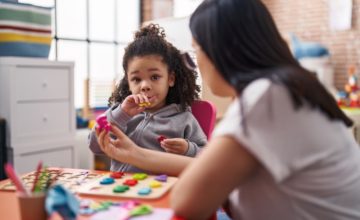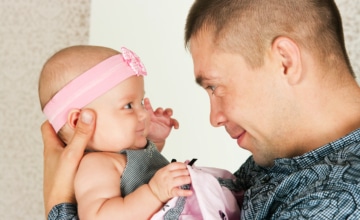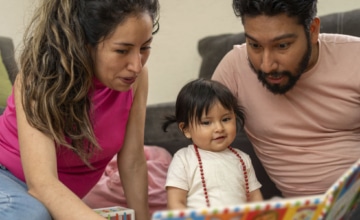Learn how to nurture your baby’s social emotional, intellectual, language, and motor development from 2 to 6 months. Explore more age ranges in our full Healthy Minds Series.
This handout is based on findings from a report From Neurons to Neighborhoods: The Science of Early Childhood Development* from the National Academy of Sciences that examined child and brain development in the early years. The information we offer is age-specific, summarizes key findings from the report, and suggests how you might be able to use these key findings to nurture your own child’s healthy development.
Key Findings
Findings from the From Neurons to Neighborhoods: The Science of Early Childhood Development include:
- Your relationship with your child is the foundation of his or her healthy development.
- Your child’s development depends on both the traits he or she was born with (nature), and what he or she experiences (nurture).
- All areas of development (social, emotional, intellectual, language and motor) are linked. Each depends on, and influences, the others.
- What children experience, including how their parents respond to them, shapes their development as they adapt to the world.
How Development Looks in Everyday Life
This example shows how all areas of Tara’s development are linked and how her parents help to encourage her healthy development
This simple game is more than just fun. Tara’s interest in playing with her parents is a sign of her social and emotional development because she has fun with her parents and can see how much they enjoy being with her. This makes her feel loved and secure and will help her develop other positive relationships as she grows.
Relationships are the foundation of a child’s healthy development.
Her desire to play this game with mom and dad leads to the development of new intellectual abilities as she learns to anticipate what comes next, an important skill for helping her feel more in control of her world. Knowing what to expect will also help her to more easily deal with being separated from you as she learns that people exist even when she can’t see them.
Tara’s early language and motor abilities emerge as she squeals, makes sounds and moves her arms to let her parents know that she does not want them to stop. When they continue, her parents let her know that she is a good communicator, and each time they reappear, she learns that she can trust them to always come back.
Charting Your Child’s Healthy Development
The following chart describes many of the things your baby is learning between 2 and 6 months and what you can do to support your child in all areas of her development. As you read, remember that children develop at their own pace and in their own way. Understanding who your child is, what her strengths are and where she needs more support, is essential for promoting her healthy development. If you have questions regarding your child’s development, ask your pediatrician.
| What’s going on: | What you can do: | Questions to ask yourself: |
|---|---|---|
| Babies are very interactive at this age. They use their new language and communication skills as they smile and coo back and forth, and enjoy babbling, starting with “ohs” and “ahs” and progressing to P’s, M’s, B’s and D’s. Your baby may babble and then pause, waiting for you to respond. | When your baby babbles, both talk and babble back, as if you both understand every word. These early conversations will teach her hundreds of words before she can actually speak any of them. | How does your baby let you know what she wants and how she’s feeling? |
| They love to imitate, which helps them learn new skills. For example, mom sticks out her tongue, baby imitates and mom does it again. This also teaches them about the back and forth of conversation. | Engage in back-and-forth interactions with gestures. For example, hold out an interesting object, encourage your baby to reach for it and then signal her to give it back. Keep this going as long as your baby seems to enjoy it. | How do you and your baby enjoy communicating with each other? What do you say or do that gets the biggest reaction from her? |
| Babies this age love to explore. They learn from looking at, holding and putting their mouths on different objects. | Introduce one toy at a time so your baby can focus on, and explore, each one. Good choices include a small rattle with a handle, a rubber ring, a soft doll and a board book with pictures. | What kind of toys or objects does your baby seem most interested in? How do you know? |
| At about 3 months, babies begin to reach for things and try to hold them. Make sure all objects are safe. A toy or anything else you give her shouldn’t fit entirely in her mouth. | Lay your baby on her back and hold brightly colored toys over her chest within her reach. She’ll love reaching up and pulling them close. You will start to see what most interests her. | How do you and your baby most enjoy playing together? Why? |
| They also begin wanting to explore their food and help feed themselves. Touching and tasting different foods is good for learning and for building self-confidence. | Let your baby play with your fingers and explore the bottle or breast during feedings. As she grows, let her handle finger foods and help hold the spoon. | How would you describe your baby’s activity level? Does she like/need to move around a lot or is she more laid-back? |
About “From Neurons to Neighborhoods”
The report From Neurons to Neighborhoods: The Science of Early Childhood Development was a 22-year effort by a group of 17 leading professionals with backgrounds in neuroscience, psychology, child development, economics, education, pediatrics, psychiatry and public policy. They reviewed what was known about the nature of early child development and the influence of early experiences on children’s health and well-being. The study was sponsored by a number of federal agencies and private foundations.
Download the PDF to view the original handout
Healthy Minds_ Nurturing Your Child’s Development from 2 to 6 Months




